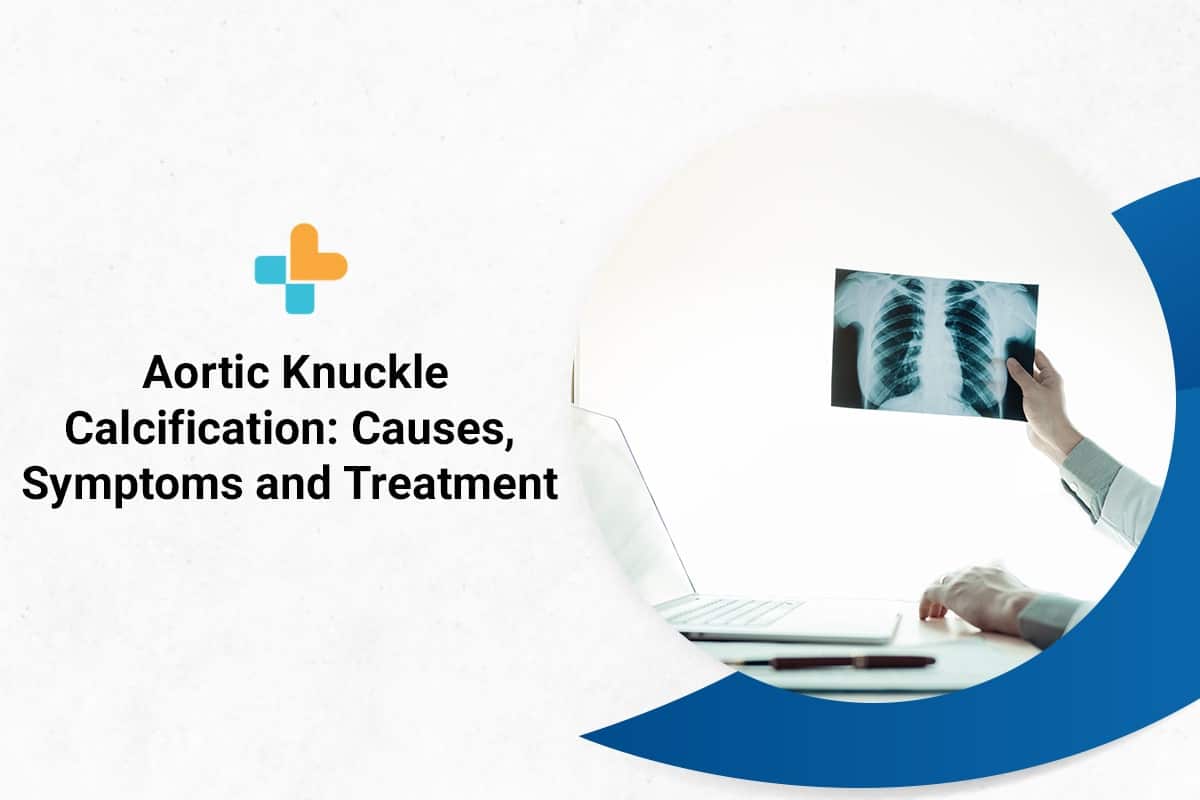The aorta is the largest artery in the body that originates at the left ventricle and moves down towards the abdomen. The aortic knuckle is located at the base of the aorta and helps to maintain a one-way blood flow through the heart.
When calcium starts depositing in this valve, the opening to the aorta can become narrow, leading to a condition called aortic knuckle calcification. Over time, this can become severe enough to restrict blood flow through the aortic valve leading to a condition known as aortic valve stenosis.
Aortic Knuckle Calcification Causes
Aortic knuckle calcification is not a disease in itself but a by-product of age. Calcium deposition is particularly common in older people but can also be pathological in younger populations. According to the American Heart Association, the most frequent type of ailment is age-related aortic valve stenosis. Calcification or scarring of the aortic valve often occurs after the age of 60, but the symptoms may not appear until the patients are 70 to 80 years old.
Calcium is an essential element for healthy bones. However, if the mineral accumulates in the aortic knuckle, it might cause cardiac complications. Calcium deposits often disturb the flaps of the aortic knuckle, making it difficult for the aortic valve to open and close smoothly. Due to scarring and calcium accumulation, these deposits usually grow in the aortic valve with age.
Note: Calcium deposits in heart valves aren’t connected to taking calcium supplements or consuming calcium-fortified beverages.
Aortic Knuckle Calcification Symptoms
Aortic knuckle calcification symptoms don’t often show up until it has reached an advanced stage, and you may not experience any signs of calcification in the beginning.
Once the condition progresses to the symptomatic stage, you may encounter symptoms of severe aortic valve stenosis such as:
- Heart murmur – an abnormal heartbeat heard through a stethoscope
- Angina – Chest pain, tightness, shortness of breath after exertion
- Feeling faint or dizzy after exertion
- High fatigue even after less than intense activity
- Palpitations – Rapid, fluttering heartbeat
- Inadequate weight gain (primarily in children)
Aortic Knuckle Calcification Treatment
Aortic knuckle calcification is a progressive condition that cannot be cured with any particular medication. This is due to the fact that once the condition has developed, it is irreversible. Your doctor may prescribe medication to address the symptoms or underlying health problems that caused the condition so as to slow down the process. In extreme conditions, surgery may be required to repair or replace the valve.
Medications
There is no known medication that can reverse the process or stop further calcification once it has started. Your doctor may prescribe medication to manage your symptoms and relieve the strain on your heart. Here are some possible medications:
- Antibiotics: Rheumatic fever, a symptom of aortic valve stenosis, needs antibiotics to prevent the infection from progressing and inflicting further heart damage.
- Blood pressure medication: Calcium channel blockers, often known as beta-blockers, can help decrease your blood pressure.
- Antiarrhythmic medication: Antiarrhythmic medications are occasionally used to control your heart’s rhythm.
- Blood thinners: Medications such as Coumadin reduce the clotting capability of blood and improve blood flow through the valves, thus lowering the chances of a heart attack.
Surgery
A surgical procedure may be necessary to repair or replace the damaged valve and reduce the mortality risk.
The aortic knuckle is repaired through a minimally invasive procedure known as valvuloplasty. It is performed through a thin, flexible tube called a catheter, that is used to reduce or delay calcification. This is a simple procedure with a recovery time less than that of open-heart surgery.
In severe cases, your surgeon may determine that your damaged valve must be replaced, which calls for open-heart surgery. A mechanical valve or a valve from a cow or a pig is used, and the recovery time of this procedure is substantially longer.
Aortic Knuckle Calcification Management
Aortic calcification isn’t always a congenital problem and you can take the following healthy lifestyle adoptions to help your heart:
- A healthy, low-saturated-fat diet
- Regular exercise
- Avoid smoking
- Regular health checkups
- Proper dental hygiene
Frequently Asked Questions
- What is the aortic knuckle?
The aortic knuckle is in the frontal chest area of the distal aortic arch as it curves posterolaterally to continue as the thoracic aorta that is going down.
- How serious is the treatment of aortic knuckle calcification?
The treatment of aorta knuckle calcification depends on the severity and extent of the disease. The treatment can range from medications to a minimally invasive surgery known as valvuloplasty.
- What can be done for aortic calcification?
Since aortic calcification is irreversible, the only options are medication or surgery, depending upon the severity and extent of the disease.
- What causes aortic calcification?
Calcium is an essential element for healthy bones. However, if the mineral accumulates in the aortic knuckle, it might cause cardiac complications. Calcium deposits often disturb the flaps of the aortic knuckle, making it difficult for the aortic valve to open and close smoothly. Due to scarring and calcium accumulation, these deposits usually grow in the aortic valve with age.
- How long can you live with aortic calcification?
Without proper treatment like medication or surgery, aortic calcification may turn out to be fatal with a survival rate as low as 50% at 2 years and 20% at 5 years.
- Can aorta calcification be reversed?
No, aorta calcification cannot be reversed. It can only be treated with medication and surgery.
If you have further queries regarding symptoms that you are currently exhibiting or would like to consult a healthcare specialist for any health concerns, reach out toAyu Health. Doctors atAyu Health have access to telemedicine so that patients can avail of consultations via video calls. We also deliver medications and collect samples for lab tests from the comfort of your own home. To book an appointment, visit Ayu Health or call us at 08069489584.
Our Hospital Locations
Cardiology Surgery Hospitals in Chandigarh | Cardiology Surgery Hospitals in Bangalore | Cardiology Surgery Hospitals in Jaipur | Cardiology Surgery Hospitals in NCR | Cardiology Surgery Hospitals in Hyderabad
Our Doctors
Cardiology Surgery Doctors in Chandigarh | Cardiology Surgery Doctors in Bangalore | Cardiology Surgery Doctors in Jaipur | Cardiology Surgery Doctors in NCR | Cardiology Surgery Doctors in Hyderabad
About the Author

Dr. Darshan Krishnappa
Dr. Darshan Krishnappa is a renowned cardiologist currently practicing at Ayu Health, Bangalore.
Dr. Darshan Krishnappa is a Cardiologist with 7 years of experience. He completed his MD in Internal Medicine from the prestigious All India Institute of Medical Sciences, New Delhi. He is specialized in cardiology.




